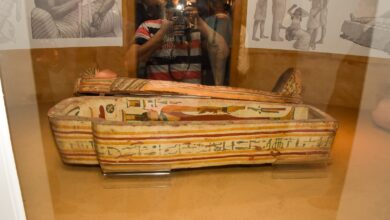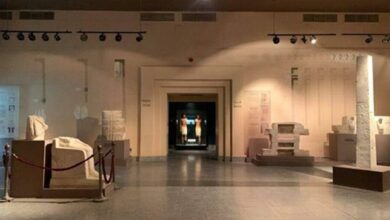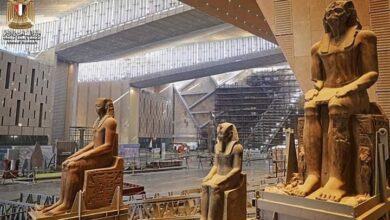While doing archival research on 19th century Egypt and the intricacies of the foundation of a modern state, historian Khaled Fahmy stumbled upon a curious account.
In the first week of Muhammad Ali’s major expedition into al-Sham (the Levant), the whole army came to a standstill for some days in the middle of the desert to try and find a ring the Khedive had lost. For Fahmy, stumbling upon this seemingly trivial incident meant questioning what the prevalent narrative of an organized army as part of a modern-state in the making really meant.
Fahmy recounted the incident in an attempt to stage the archival document as “imaginary content”, a gesture alluded to by artist Hassan Khan who hosted the talk.
Besides looking into the complexities of writing history through institutional mechanisms, Khan encouraged Fahmy to tap into this imaginary space, whereby alternative narratives are constructed through the power of interpretation of historical documents.
Fahmy found the missing ring story in an archival collection consisting of 63 original folders written in Turkish and covering the ten-year expedition from its launch in Raydaneya, to the northeast of Cairo.
He compared the archive which contained the missing ring story to another collection of well-annotated, chronologically organized documents from the same period that were translated into Arabic. The organized nature of this collection, which did not contain anecdotal details such as the army’s quest to locate the Khedive’s missing ring aroused Fahmy’s curiosity. “Who did these translations? How did they do it? And for whom?” he asked.
This collection was part of the late King Fouad’s attempt to organize historical writing in the 1930s, documenting his family history with a conscious focus on the institutionalized process of building a modern state. Hence, the missing ring, as a trivial and potentially misleading detail, had no place there. Fahmy suggests that the gap between the two collections raises poignant questions about Muhammad Ali's widely-celebrated status as the founder of the modern Egyptian state. Was the army, an institutional cornerstone of the new state, actually fighting wars for the Egyptian nation, or under the name of a dynastic family?
Fahmy’s work stresses the fact that working with historical documents constantly reveals untold stories. Behind any document lies the possibility for multiple different readings.
But, in Egypt, access remains at the heart of the question. Fahmy deploys vivid imageries from the archives to illustrate the fact that we miss so much when the records are withheld from us. In a direct comparison, he raised the example of the 1967 War, whose records, if any exist at all, are kept sealed in a black box.
“Our retreat in 1967, a defeat we still suffer from up to the present day, is a historic event. No army has been defeated this way in history,” he says, comparing the lack of records to the detailed account of Muhammad Ali’s army’s retreat in the Levant expedition, to which we have access through the archives.
This account also tells us that the army commander, Ibrahim Pasha, son of Muhammad Ali, was the last to retreat, after he secured his army’s passage. “He was the last to retreat and yet he was the son of the foremost man in the country,” Fahmy says and stops there. But for his audience, the connection to the ever present political situation was obvious.
It is from this particular position, somewhere in the present, that the quest to look into history, as documented in the archives, can be both inspiring and suggestive.
Fahmy’s decision to engage with the world of art to advocate for his cause, namely to condemn the closure of the national archives, is well chosen. Moving beyond critiques of the security apparatus' dominance over the state archives, which by now is almost universally accepted, such an engagement also serves to open public consciousness to the vast arena of possibilities that lie within this black box.
Imagine novelists working from the archives, filmmakers, television series writers and the like, he suggests, in an offering that renders the archive like an imaginary production laboratory. And the same should be true of museums, libraries, and all other institutions which pride themselves on being the guardians of knowledge.
Khan continues his series on Sunday, 14 November with curator and writer, Bassam el-Baroni, who borrows the voice of a Slovenian cultural theorist’s half Egyptian son to talk about invisible stories of Egyptian visual art, lost in ideological incarcerations.
The talks are part of the Bidoun Library project, an attempt to collect relics from the region’s production that could disappear from its cultural history.
The next talk will be held at the Townhouse Gallery of Contemporary Art, 1st floor, on Sunday, 14 November at 7:00 pm.




